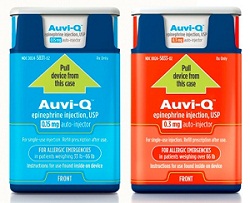A study in the Annals of Emergency Medicine found a high rate of injuries to pediatric patients stemming from Mylan's ($MYL) EpiPen autoinjector use. Lead author Dr. Julie Brown of Seattle Children's Hospital made several recommendations to increase patient safety during use of the delivery device, and said the use of an alternative self-retracting needle from Sanofi ($SNY) could avoid many of the complications.
The problem is compounded because parents are often responsible for injecting their children; of the 25 injuries identified in the study, 15 were caused by the patient's parent, 6 by nurses, three by educators and one by the child.
"We were surprised by the severity of some of these injuries, including thigh lacerations and embedded needles," Brown said in a statement. "We can't think of anywhere else in pediatric medicine where we would hold a needle in an awake child's leg for 10 seconds. That's a set-up for injury, particularly in the uncontrolled, stressful setting of anaphylaxis. In addition, the instructions for use do not mention patient restraint, so parents are not appropriately prepared."

Brown and her team recommended that the patient's leg be immobilized, controlling the action of administering epinephrine and site of delivery, inserting the need in the thigh for as little time as possible, using a strong needle that does not bend during use and never reinsuring the needle.
She also recommended using Sanofi's Auvi-Q self-retracting needle, which only stays in the body for two seconds. "While EpiPen likely holds a larger share of the epinephrine auto-injector market, it is notable that we did not see any injuries associated with the use of Auvi-Q or Allerject devices, even in recent years," Brown said in a statement.
The device also improves ease of use by instructing the user via a recorded voice to hold the needle in the correct position. The voice also counts down as the injection is completed.
But Dr. Brown also stated that she isn't trying to scare parents and caregivers from using the EpiPen. "We want to emphasize that these injuries are uncommon and should not deter parents and patients from using their epinephrine auto-injectors when needed," she said. "Epinephrine is a life-saving medication that must be given early in the course of anaphylaxis. Our goal in reporting these injuries is not to create fear of the EpiPen device but simply to identify limitations with the device, and hopefully motivate improvements in product design and instructions for use."
- read the release
- here's the study